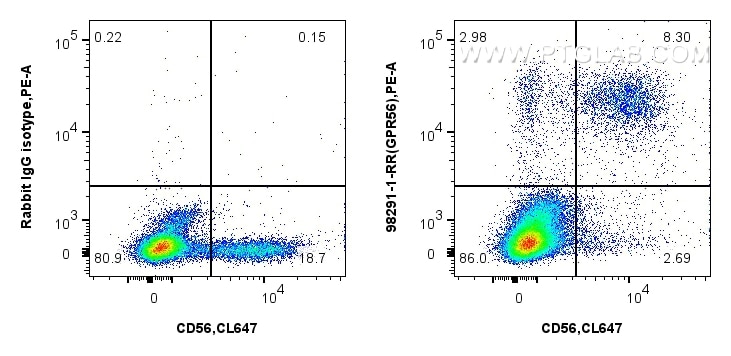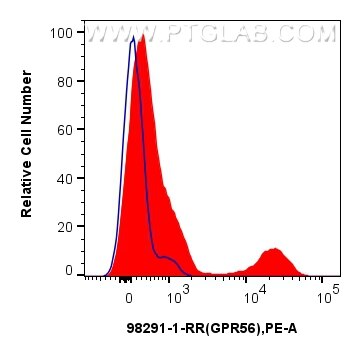Tested Applications
| Positive FC detected in | human peripheral blood leukocytes |
Recommended dilution
| Application | Dilution |
|---|---|
| This reagent has been tested for flow cytometric analysis. It is recommended that this reagent should be titrated in each testing system to obtain optimal results. | |
| Sample-dependent, Check data in validation data gallery. | |
Product Information
98291-1-RR targets GPR56 in FC applications and shows reactivity with human samples.
| Tested Reactivity | human |
| Host / Isotype | Rabbit / IgG |
| Class | Recombinant |
| Type | Antibody |
| Immunogen | Recombinant protein Predict reactive species |
| Full Name | G protein-coupled receptor 56 |
| Calculated Molecular Weight | 78 kDa |
| GenBank Accession Number | NM_001145771.2 |
| Gene Symbol | GPR56 |
| Gene ID (NCBI) | 9289 |
| Conjugate | Unconjugated |
| Form | Liquid |
| Purification Method | Protein A purfication |
| UNIPROT ID | Q9Y653 |
| Storage Buffer | PBS with 0.09% sodium azide , pH 7.3 |
| Storage Conditions | Store at 2 - 8°C. Stable for one year after shipment. |
Background Information
GPR56 (G-protein-coupled receptor 56, also named ADGRG1) is a member of the adhesion G-protein coupled receptor (aGPCR) family and one of the important players in the normal development of the brain. It plays a pivotal role in diverse neurobiological processes, including cortical formation, oligodendrocyte development, and myelination (PMID: 32798453). Moreover, GPR56 has been reported to regulate VEGF secretion and angiogenesis in melanoma (PMID: 37579299).
Protocols
| Product Specific Protocols | |
|---|---|
| FC protocol for GPR56 antibody 98291-1-RR | Download protocol |
| Standard Protocols | |
|---|---|
| Click here to view our Standard Protocols |





